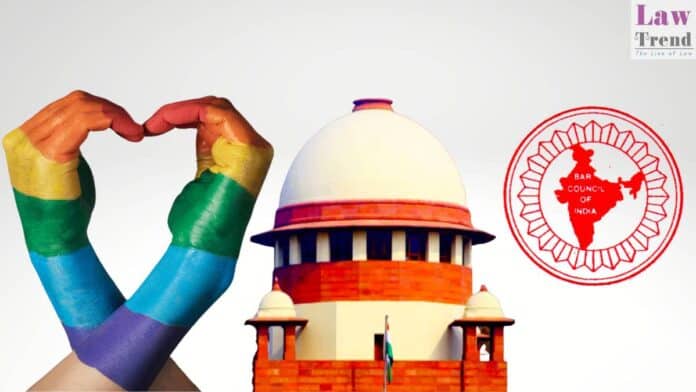The Bar Council of India on Sunday expressed its concern on same sex marriage issue being heard in the Supreme Court, saying it would be “catastrophic” to overhaul something as fundamental as the conception of marriage by the court and the matter should be left to the legislature.
In a resolution, the lawyers’ body said that any decision by the apex court in such a sensitive matter may prove very harmful for the future generation of our country.
“India is one of the most socio-religiously diverse countries of the world consisting of a mosaic of beliefs. Hence, any matter which is likely to tinker with the fundamental social structure, a matter which has far reaching impact on our socio-cultural and religious beliefs should necessarily come through legislative process only, the meeting unanimously opined.

“Any decision by the apex court in such a sensitive matter may prove very harmful for the future generation of our country,” it said in a resolution.
The resolution was adopted in a joint meeting attended by representatives of all the state bar councils.
“Certainly the laws made by the legislature are truly democratic as they are made after undergoing thorough consultative processes and reflect the views of all sections of the society. The legislature is accountable to the public,” it said.
“The joint meeting, thus, is of the unanimous opinion that in view of the sensitivity of the issue of same sex marriage, having a spectrum of stakeholders from diverse socio-religious background, it is advisable that this dealt with after an elaborative consultation process involving different social, religious groups by the competent legislature.”
The BCI said that law is a “codified societal norm” that reflects the collective conscience of its people, and religion being intertwined with culture, greatly influences the codification of law and societal norms in any civilised society.
The BCI said though it welcomes the Supreme Court’s step in furthering the debate on the matter, it wants the issue to be “left for the legislative consideration.”
The council said that according to documented history, ever since the inception of human civilization and culture, marriage has been typically accepted and categorised as a union of biological man and woman for the twin purpose of procreation and recreation.
“In such a background, it would be catastrophic to overhaul something as fundamental as the conception of marriage by any law court, howsoever well-intentioned it may be,” it said in the resolution.
The BCI said that issues pertaining to social and religious connotations should typically be dealt with by courts through “doctrine of deference” and the legislature being truly reflective of the will of the people is best suited to deal with such sensitive issues.
“Every responsible and prudent citizen of the country is worried about the future of his/her children after coming to know about the pendency of this matter before the Supreme Court.
“More than 99.9 per cent of people of the country are opposed to the idea of same sex marriage in our country,” it said.
“The Bar is the mouthpiece of the common men and therefore, this meeting is expressing their anxiety over this highly sensitive issue.
“The Joint Meeting is of clear opinion that if the Supreme Court shows any indulgence in this matter, it will result in destabilising the social structure of our country in the coming days.
“The apex court is requested and expected to appreciate and respect the sentiments and mandate of the mass of the country”, it said.
The BCI also resolved to request the Centre to frame effective law for the protection of lives, interests and privilege of the advocates and their families in case of any attack against them.
The SC’s five-judge constitution bench hearing scheduled to be held on April 24 on a batch of pleas seeking legalisation of same sex marriage was cancelled after one of the judge reported unwell, according to sources.
The top court had on April 20 said it may be redefining the “evolving notion of marriage” as the next step after decriminalising consensual homosexual relationships which implicitly recognised that same-sex people could live in a stable marriage-like relationship.
The bench headed by Chief Justice D Y Chandrachud did not agree to the contention that unlike heterosexuals same-sex couples cannot take proper care of their children.







